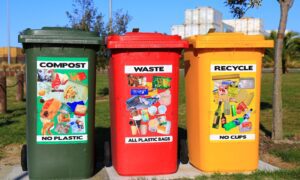The topic of waste management is not something typically discussed around the dinner table, but it is a serious and growing problem. Waste generation has grown significantly around the world and is projected to increase 70 percent in the next 30 years.
The Problems with Waste
In the United States, most waste is directed to landfill sites, and some states are seeing landfills approaching capacity. Worldwide, as much as 40 percent of waste ends up in open dumps that pollute groundwater and contribute to the spread of disease.
Biodegradable waste generates powerful greenhouse gases which contribute to global warming. Most of the largest waste dumps in the world are close to the sea, so they contribute to coastal and marine pollution. And the accumulation of plastics in the food chain is causing concern around the world.
Smart Waste Management Technologies
To deal with the problems associated with waste management, many companies are developing new technologies that will make trash collection more environmentally friendly, more efficient, and more cost-effective. In addition, solutions are being developed to capture gasses for more beneficial use and process waste for reuse purposes.
Here are some of the recent waste management technology advances:
1) Smart waste bins have been developed to improve the sorting and processing of recyclables. These bins use artificial intelligence to sort recyclables into separate compartments, compress the waste and monitor the bin fill level.
2) Waste level sensors have been developed to monitor waste levels in bins and dumpsters. These sensors help waste collection companies make waste collection timelier and more efficient. This also prevents waste from overflowing and creating contamination problems.
3) Garbage truck weighing systems help monitor fill levels thus reducing collection trips, saving collection costs, and using less environmentally problematic fuel.
4) Creative new waste collection methods include pneumatic waste pipes. In dense urban areas, pneumatic waste bins are installed and connected to underground pipes. The waste deposited in the bins travels through the pipes to collection points where it can be sorted and hauled away, thus eliminating collection trucks, and advancing waste processing.
5) Solar-powered trash compactors can be used to reduce trash collection trips.
6) E-waste kiosks have been developed to accept potentially harmful electronic waste, even rewarding the individuals who recycle electronic waste materials.
7) Sorting robots are being used at waste plants to more accurately and quickly sort waste. That improves the quality and salability of plastic bales, for example.
8) A company has developed a u-shaped net that is dragged by an ocean vessel to pick up plastic ocean waste that is gathered for proper recycling.
9) A method has been developed to recover precious metals in disabled vehicles using a plasma torch, thus minimizing the need to mine new ore.
Other Waste Management Improvements
The smart processing of waste includes finding ways to process waste and turn that waste into valuable resources such as turning methane gas in a landfill into a renewable source of fuel for waste collection fleets as well as serving local communities.
Concluding Thoughts
Better waste management is a critical need. And continuing innovations, along with many efforts focused on improving the environment, are needed from everyone.



































